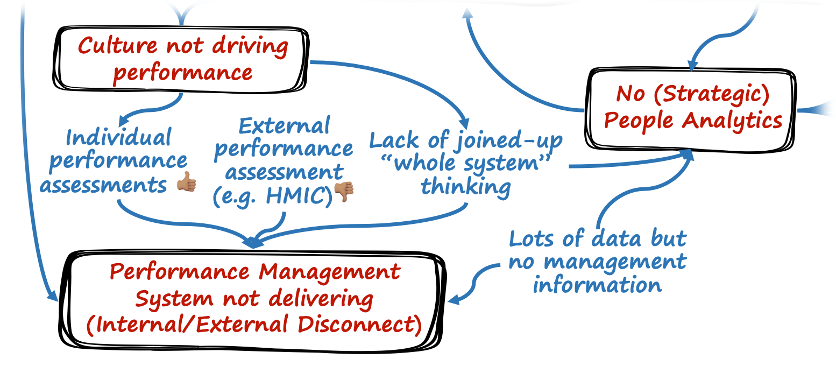Introduction
Perform Green were commissioned to help support a police force moving beyond the HMICFRS ‘engage’ process by delivering an organisation development and People Services review. This engagement followed previous successful delivery of organisational development work to the same organisation. The review was commissioned by the Chief Constable and the CEO of the Office of the Police and Crime Commissioner (OPCC). The Perform Green team engaged with the most senior stakeholders in both the Force and OPCC leadership teams, including the incoming HR Director, Deputy Chief Constable, and Deputy CEO. Policing is a people-based business, delivering services to local people. Consequently, strategic, effective, and forward-looking People Services have become accepted as critical to enabling the whole organisation to deliver better performance.
People Services included core functions such as workforce planning, recruitment, performance management, employee relations, equality, diversity and inclusion, wellness, people strategy, people policy and change management. The review was prompted by a widespread dissatisfaction with People Services not meeting organisational and customer expectations. The initial aim of the review was to analyse service efficiency and effectiveness, understand the root causes of any problems, identify service improvements, and make the recommendations that would form the foundations for strategic organisational change.
Delivering the Requirements
In consultation with the CEO (OPCC) and incoming HR Director, it was agreed that:
- The project output would provide a detailed analysis of People Services and provide specific actions that would lead to improvements across each service.
- The review report would include recommendations for improvement to People Services and the foundations for strategic organisational change, categorising and compiling them into a roadmap to deliver service improvement.
- The review report would provide the basis for a future Target Operating Model (TOM) for the People Services function as well as a model team organisation structure aligned to delivering the service improvement and foundations for organisational change.
Prioritisation of actions and subsequent delivery was to be the responsibility of the incoming HR Director, in consultation with Force and OPCC senior leaders to ensure alignment with organisational priorities.
What we did
Using external information to establish what ‘good HR’ looks like, the team first devised a benchmark against which to form an assessment of each individual service as well as the whole function. The benchmark was informed by recognised good practice in other police forces (to understand what is realistic), as well as other public sector good practice. It included desk research derived from thought-leaders and opinion from industry leaders such as the Chartered Institute of Personnel & Development (CIPD), XpertHR, Disrupt (HR), McKinsey & Co., and Bain & Co., as well as the teams’ own experiences leading People Services, HR, and Organisational Development functions. Factors included in the benchmark incorporated the extent of strategic focus and embedded talent management, communication and collaboration approach and skills, analysis and data-led decision making, impact of technology, leading process automation, and compliance and legal expertise.
In the discovery phase, the Perform Green team undertook an accelerated ‘deep dive’ into People Service delivery gathering information pertinent to assessing effectiveness. This was achieved through interviews with heads of People Services teams and all service leads, as well as with some or all the people working in each service team. For completeness, Perform Green consulted with key stakeholders across the full spectrum of people-related services. These included functions such as vetting, professional standards, health and safety, occupational health, learning and development, enterprise resource planning (ERP), resourcing and organisational change to ensure the whole organisational entity was considered in assessing the performance of People Services.
In addition to team and key stakeholder interviews, Perform Green undertook a desk review of published and draft internal plans and strategies (e.g. the People Strategy), published internal reports and meeting notes, published external reports (e.g., PEEL inspections), and conducted a customer satisfaction survey of departmental leaders – which verified many of the findings gathered from interviews.
Finding the root causes of emerging issues
The Perform Green team identified a high number of service areas that individually were sub-optimal or delivered sub-optimal outcomes for the organisation. A root cause analysis was performed which identified five frequently occurring factors that were contributing to performance levels in different degrees, in the different service lines.
These were:
- capacity
- capability
- budget
- governance and
- technology.
The team examined these and other factors, to begin to establish what would be the most appropriate solutions to the performance issues. Building on our analysis, Perform Green then identified what were considered to be the most important actions and classified them according to whether they were short term fixes or more strategic and long-term in nature. These started to form what would become the foundations for strategic change and the roadmap for prioritising.
Sense-making and “whole system” thinking
As the review progressed and a considerable range of individual issues and areas of concern were uncovered, it became clear that there was a complex systemic or “whole system” dimension contributing to the performance of People Services within the organisation. Each individual issue needed to be seen within the context of the complex whole system, where wider organisational factors and individual issues with People Services were both caused by, and the cause of other issues.
This led the team to develop a ‘whole system’ approach to the People Services review, building up a rich picture of the cause and effect of complex people-related issues across the organisation – an extract of which is shown below. Some further examples of interconnections and correlations included the impact of:
- PEEL assessments on employee engagement,
- Media attention, public opinion and the impact on staff recruitment,
- Technology and the impact on manager and employee experience.
After multiple iterations, testing with senior stakeholders, adaptation and improvement, the resulting whole-system diagram became a comprehensive representation of the inter-relatedness of all the people-based issues. It immediately provided the Force with significant insights on how best to address the overall performance of People Services and form the foundations for strategic organisational change in the Force.
A facilitated workshop with the People Services leadership team helped identify the foundational things they needed to get right to deliver effective People Services and gain the most benefit for the organisation and its workforce. Working together, we identified what the key actions were to drive improvement and built a strategic and tactical action plan and roadmap to deliver the change.
Review Outcomes
The Perform Green team delivered the final report with presentational workshops for stakeholders and senior leaders within an 8-week period. Synthesising insights, data, analysis and observations, this exercise delivered recommendations for the foundations for strategic change and improvement to People Services. It provided the incoming HR Director with a ‘deep dive’ analysis of the 5 core functions of People Services, and the information they needed to prioritise improvement actions to align with overall organisational priorities.
The presentation of the ‘whole system’ organisational analysis enabled senior leaders to get a clear understanding of the causes and effects of factors affecting the delivery of People Services, to the extent that they could identify and prioritise tactical and strategic remedial actions. Although it was beyond the scope of the original performance review, the whole system approach was very well received by the Chief Constable, the OPCC CEO and their senior teams, who noted that this exercise joined the dots organisationally to help them work out where to focus for maximum positive impact.
- Critically, the review recommended a change in reporting line for the incoming HRD to be directly to the Chief Constable and on the senior leadership team demonstrating the importance the force now place on People Services and its ability to positively impact organisational performance.
- It also led to immediate actions being put in place – both short-term service fixes and longer-term strategic improvements.
- Finally, the roadmap on which the foundations of strategic organisational and workforce change could be based enabled the new HR Director to get started immediately on the implementation of positive change.
Conclusions
Owing to the extent of issues flagged, the Perform Green team did not comment extensively on the pockets of good work that were being delivered, some of which went unnoticed by the organisation, and were somewhat lost in the noise that surrounded the higher profile service issues. The review found many good people doing ‘good things’, but a huge disconnect between individual effort and positive outcomes – individual actions were simply not changing the big picture.
The systemic, cultural and interconnected nature of issues uncovered, and the subsequent impact on the workforce and organisational performance had not previously been appreciated within the Force. Consequently, what started out as a service performance assessment evolved into a much wider organisation development review, leaving a roadmap to build the foundations for strategic organisation-wide change. Fixing the issues at organisational and service level will in turn ensure the People Services team can better harness their individual and team efforts to deliver improved outcomes for the organisation and its workforce.
What the client said
“Perform Green got to the root causes of the problems quickly and set out a clear route to improve. This was achieved professionally, quickly, enabling swift decisions to be made. Perform Green work presented evidence of the challenges we faced and created both the case for change and actions to take. Something that was really difficult for the service to do internally.”
Chief Executive,
Office of the Police and Crime Commissioner












